LATEST NEWS
Politics is the art of compromise. On this note, Capital & Main asked Assemblywoman Lorena Gonzalez (D-San Diego) about the removal of 365,000 In Home Support Service (IHSS) workers from Assembly Bill 1522, the paid sick leave bill she authored. (See “Landmark Sick Leave Law Signed.”) The measure, signed into law September 10, grants this employment benefit to 6.5 million private-sector workers statewide. It takes effect on July 1, 2015. IHSS workers help the disabled and elderly with their daily household and medical needs. According to the Economic Policy Institute, nationally 93 percent of such workers are female, with 27 percent of them Hispanic and 18 percent African American.
“At the end of the day,” Assemblywoman Gonzalez said, “we were forced to take that specific group out. “It was a condition of having the bill signed by Governor Brown. His view is that IHSS workers are in the middle of statewide bargaining,
» Read more about: Paid Sick Leave Law Excludes Homecare Workers »


Over a span of 20 summer days truck driver Daniel Linares had moved some 110 cargo containers at the Ports of Los Angeles and Long Beach for Pacific 9, a drayage company based in Carson.
Linares’ August 15, 2014 check showed his gross earnings to be $3191.87. But another line item on the check stub offered a nasty payday shock: By Pac 9’s calculations Linares owed the company $296.47. In other words, he had received a “negative” paycheck.
Pac 9, a company whose “180-plus independent drivers” annually deliver more than 100,000 containers from Southern California’s ports and whose “customer list includes many of the most recognizable Fortune 100 companies,” according to the company website, had handed Linares the bill for the insurance, registration and other expenses incurred for the truck he leases from the company. He had already paid up-front for its fuel.
» Read more about: Port Truck Drivers Receive “Negative” Paychecks »


There has been increased attention recently paid to America’s vast infrastructure needs. The White House, in conjunction with the Treasury and Transportation Departments, even held a summit this week to bring together key leaders from state and local governments, as well as private sector investors, to discuss best practices for increasing investment in infrastructure projects in our communities.
We know that rebuilding America can be an effective way to rebuild our economy as well, but only if the deals are designed in a way that truly reflects the needs of our neighbors and our neighborhoods. That’s why we at In the Public Interest developed the Infrastructure Justice framework, a useful document for anyone who wants to ensure the investments that fund infrastructure projects meet the true infrastructure needs of our communities and help build the middle class.
By carefully evaluating public-private partnerships (P3s), and negotiating to include best practices for transparency,
In this uncertain post-recession era, economic inequality seems to be the only thing you can count on being in full supply. It’s certainly a subject that’s increasingly on people’s lips – thanks in no small part to Jacob Kornbluth’s 2013 documentary, Inequality for All. The film, wryly narrated by economist Robert Reich, lays out Reich’s astute perspective on how our country has arrived at the point where 400 Americans own more wealth than the entire bottom half of the country combined.
Sunday the Southern California Chapter of the American Civil Liberties Union will screen Inequality for All, an event that will serve as a refresher course for some and an eye-opener for others who have not seen the film. Afterwards, Harold Meyerson, American Prospect editor-at-large and Washington Post columnist, will offer his always lively insights into what’s happened since the documentary’s premier, along with a discussion of commercial property tax reform.
» Read more about: Harold Meyerson Speaks on ‘Inequality for All’ »


Among the puffier news stories making the rounds today has been Monday’s unveiling of a portrait of former Governor Arnold Schwarzenegger by painter/photographer Gottfried Helnwein. (The artist’s other subjects have included singer Marilyn Manson and Schwarzenegger’s fellow Austrian, Adolf Hitler.) The portrait is a giant, hyper-realistic yearbook image of a smiling Schwarzenegger, backgrounded by a ghostly outline of California’s state seal. It will hang in the Capitol next to a wildflower landscape occupied by a more modestly proportioned Gray Davis, the man Schwarzenegger replaced after the 2003 recall election.
It’s worth remembering that Davis didn’t lose his job because he was some corrupt autocrat along the lines of Louisiana’s Huey Long. Instead, he was the collateral damage from a Texas-sized conspiracy led by energy trader Enron to hike up the cost of electricity for Californians. The resulting budget crisis and public backlash led to a celebrity coup in which frustrated citizens were allowed,


Today is a big day for Lionsgate Entertainment, and we want to help celebrate. That’s why on the occasion of the annual shareholder’s meeting of this hugely successful film company (taking place right now in Toronto), AFM musicians are proud to present a musical tribute to Lionsgate and its executive leadership – a little number we call “Right Here at the Top.”
AFM musicians created the song as part of our efforts to draw attention to Lionsgate’s destructive offshoring of musical scoring work, even as it simultaneously takes millions in tax dollars — moneys intended to enrich our communities. Of course the story told by the CEO in our song may not be exactly the story told by Lionsgate’s executives to their shareholders. But wait –– what’s that? The executives at Lionsgate fail to provide important information to their beloved shareholders?
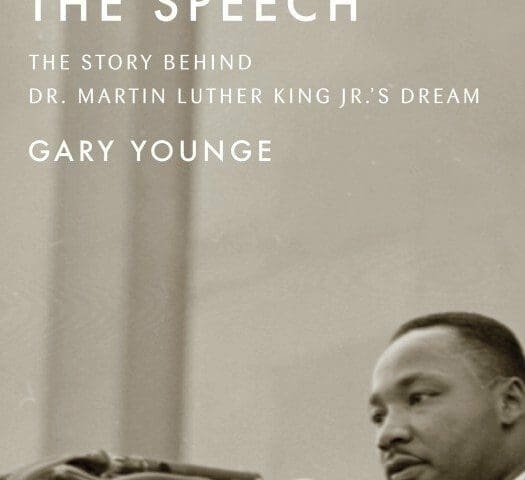

August 28th marked the 51st anniversary of the historic March on Washington for Jobs and Freedom. On that sweltering day in 1963, amidst an atmosphere of racial tension stoked by political indecisiveness, as well as acts of violent Southern resistance defined by bombings and bloody protests, 250,000 Americans converged on the National Mall. There, facing the Lincoln Memorial, educators, clergymen, entertainers, civil rights leaders, politicians and ordinary citizens listened to a day of speeches, prayers and song. They had gathered so that their voices could be heard throughout the nation, but one voice on that day would be heard above all others.
Dr. Martin Luther King Jr. was the last speaker when he delivered his “I Have a Dream” speech. That historic oration is the subject of The Speech: The Story Behind Dr. Martin Luther King Jr.’s Dream, by Chicago-based journalist Gary Younge. Its four chapters brim with key insights and revelations about those troubled times,
» Read more about: Gary Younge on MLK’s Most Famous Speech »


Readers of Capital & Main are all too familiar with wage theft and job misclassification – twin plagues that afflict American workers, especially truck drivers at the Los Angeles and Long Beach ports. Employers use wage theft to shortchange employees out of their wages and benefits by shaving hours off time cards; job misclassification, on the other hand, allows companies to deny that the people working for them are even employees at all, but freelancers who are ineligible for government-provided benefits such as unemployment insurance and workers’ compensation. By misclassifying their workers, employers do not pay the kinds of payroll taxes that provide these and other services to workers.
Now, thanks to an epic investigative series published yesterday by the McClatchy news syndicate (publisher of the Sacramento Bee), in partnership with ProPublica, these two issues have been pushed before a national audience.
» Read more about: News Series Exposes Massive Employer Fraud in Construction »


In 2012 California’s construction industry took in a respectable $152 billion, employed nearly a million workers and is now projected to grow 26 percent by 2020. But according to a recently released report, a pall is threatening to settle over this otherwise bright horizon. Sinking Underground: The Growing Informal Economy in California Construction identifies an ever-expanding segment of workers in the industry who are not reported by their employers or are misclassified as independent contractors—characteristics of the “informal economy,” or what is more commonly referred to as an underground economy.
The study’s disturbing research suggests that informal construction, which benefits the state’s unscrupulous labor brokers and contractors, and the real estate developers who hire them, is partly responsible for the hollowing out of California’s middle class.
Sinking Underground was conducted by the Economic Roundtable and tracked labor statistics from 1972 to 2012.
» Read more about: Study: Cheaters Prosper in State’s Informal Construction Economy »


Whenever the subject of raising hourly pay to a livable level comes up in Los Angeles, you can expect two stalwart foes: The Chamber of Commerce and the Central City Association. They both represent business and they always argue that paying working people a wage they can live on will hurt business owners. I cannot recall a time they ever claimed anything else.
But now a new voice from the business community has surveyed the field of low-wage work and come up with a conclusion quite opposite the Chamber’s and the Association’s. A member of the faculty at MIT’s Sloan School of Management (named after a former president of General Motors, no less) compared wages and company results among sales people and check-out clerks. These jobs happen to rank one and two in the number of employees in the country, and they are notorious for low pay, part-time hours and oppressive working environments.
For many, the legacy of Labor Day has been forgotten. We forget about the struggle that so many fought and even died for to achieve decent working conditions. We take for granted that children no longer have to slave away in American factories for 17 hours a day, six days a week. We undervalue what it took to get the weekend. After all, that’s what makes Labor Day such a treat in the first place–we get a three-day weekend instead of the boring old two. And for those of us still lucky enough, the 40-hour work week is just the standard.
Longtime president and founder of the American Federation of Labor, Samuel Gompers said:
“Labor Day differs in every essential way from the other holidays of the year in any country. All other holidays are in a more or less degree connected with conflicts and battles of man’s prowess over man,


35th Annual Labor Day Parade: Join the L.A. labor movement as we celebrate Labor Day weekend!
Monday, September 1
Parade begins 10 a.m., Broad Ave. and E Street
Rally and picnic start noon, Banning Park
Wilmington, CA
Download Flyer
For more information, contact the Labor Day Committee at (562) 595-1891
Labor Day Concert with Sheila E, Eric Benet and Irvin Mayfield Quintet
Monday, September 1
Doors open 4 p.m., concert starts 5 p.m.
Conga Room at L.A. Live
Download Concert Flyer. For more information or to purchase tickets, contact Todd Hawkins at todd@thetoddgroup.net or (213) 300-9342.


Assembly Bill 1522, created to give all California workers at least three days of paid sick leave, passed the legislature Friday, but with a key change: In-home health-care workers who assist disabled and elderly Californians will now be excluded from coverage. The compromise resulted in two important union backers of the bill, authored by Assemblywoman Lorena Gonzalez (D-San Diego), to withdraw their support.
According to the Sacramento Bee, “The Service Employees International Union and the American Federation of State, County and Municipal Employees abandoned the bill after it was rewritten to exempt home health-care workers.”
Another closely watched measure, Senate Bill 270, also passed its final hurdle Friday, the Los Angeles Times reports. The bill, authored by senators Alex Padilla (D-Pacoima), Kevin de Leon (D-Los Angeles) and Ricardo Lara (D-Huntington Park/Long Beach), will ban single-use plastic bags in grocery stores and other retail outlets.


In a victory for public safety over private profitability, Senate Bill 1019 passed the state Assembly and Senate with strong bipartisan consent on August 27 and 28. Known as the Consumers’ Right to Know: Flame Retardants in Furniture bill, the measure – introduced by Senator Mark Leno, (D-San Francisco) — requires upholstered furniture manufacturers to disclose to consumers the use or absence of flame retardant chemicals on furniture labels.
“SB 1019 gives consumers what they have demanded for decades—the right to know what is in their furniture and the power to make an informed decision about whether to purchase it,” Leno said in a press statement.
Given SB 1019’s diverse support—from business associations to consumer groups, environmental organizations and labor unions—it appears likely Governor Brown will sign the bill by the September 30 legislative deadline, after which it would take effect January 1, 2015.
Getting business on board with SB 1019 proved to be a critical turning point for the bill.
» Read more about: Public Safety, Worker Protection Bills Advance to Governor’s Desk »
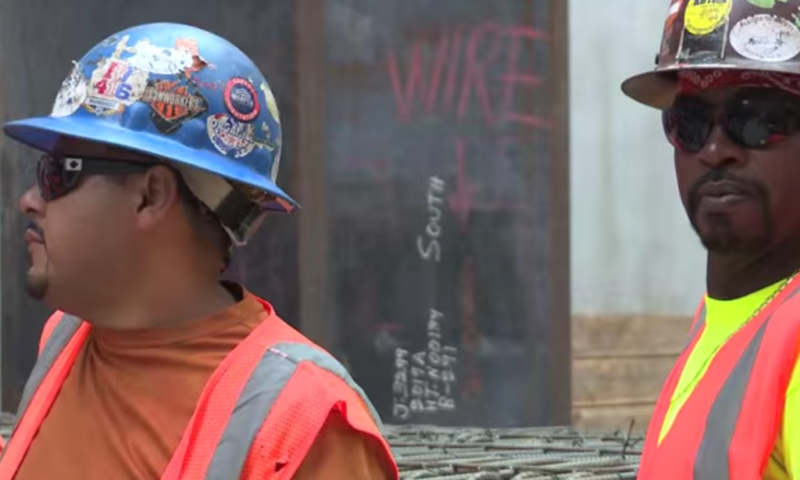

There is a long tradition in the United States, and perhaps most of the world, of binary thinking when it comes to work.


This weekend marks the unofficial end of summer as well as a chance for us to reflect on the achievements of American workers. This year workers across our country have a lot to celebrate, thanks in part to a series of executive orders signed by President Obama.
The Fair Pay and Safe Workplaces Executive Order is particularly important for Americans working for a federal contractor. The Federal government spends $500 billion in taxpayer dollars every year for goods and services provided by federal contractors, but too many are guilty of repeated and flagrant violations that endanger the lives of workers and cheat employees out of pay. Obama’s executive order will keep taxpayer dollars out of these companies’ coffers by requiring all bidders to disclose labor-law violations as far back as three years.
Governors and mayors across the country have an opportunity to follow President Obama’s lead to simultaneously protect contractors and taxpayers.
» Read more about: Labor Day 2014: Fair Pay and Fair Play for Workers »
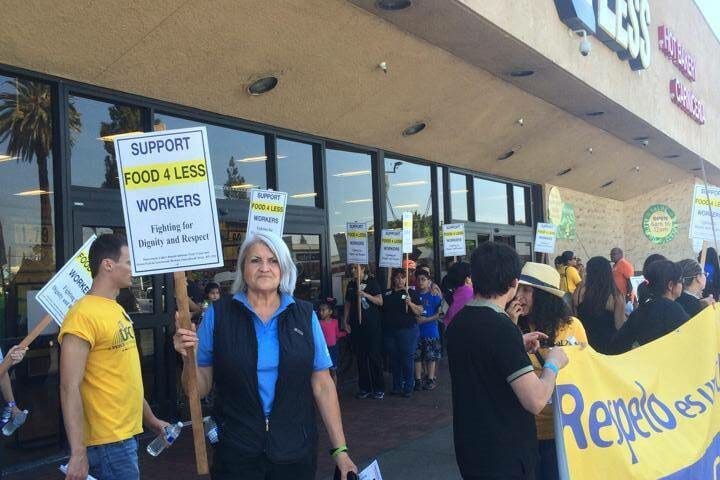

Food for Less grocery workers and the Kroger Corporation backed away from the edge of a cliff Tuesday, following weeks of a labor standoff. Both sides averted a potentially devastating strike with a tentative labor agreement whose proposed contract covers some 6,500 workers at 90 stores throughout Southern California.
Employees authorized a strike in July and then launched a consumer boycott in the face of Kroger’s threat to slash contributions to medical plans, reduce hours and transfer the work of higher-paid employees to those lower on the wage scale.
In mid-August hundreds of workers turned out on informational picket lines and urged consumers to shop elsewhere. During this time, Kroger recruited strike-busters from Ralphs, another grocery chain it owns.
Why did Kroger refuse to budge? The Cincinnati-based Fortune 500 Company that owns Food 4 Less, Ralphs and Frys recorded a half-billion-dollar profit for the first quarter of 2014,
» Read more about: Food 4 Less Workers Reach Tentative Agreement With Kroger »


Things are heating up inside the state Capitol in Sacramento. As an August 31 deadline for the end of the 2013-14 legislative year looms, union labor is facing off with business forces over the fate of pending laws governing pay, employee benefits and the environment.
A level playing field is not part of the lobbying landscape when it comes to swaying undecided legislators on these bills, said David Huerta, president of Service Employees International Union-United Health Workers West. Huerta told Capital & Main by phone that business lobbyists enjoy a two-to-one numerical advantage over labor representatives under the Capitol dome.
Huerta witnessed that dynamic first hand this pivotal week as business and labor interests met separately with state lawmakers over Assembly Bill 2416, the California Wage Theft Recovery Act.
Introduced by Assemblyman Mark Stone (D-Scotts Valley), AB 2416 would mandate local programs to allow employees to file liens against employers for unpaid wages.
» Read more about: Business Interests Clash With Public’s As Legislative Year Ends »
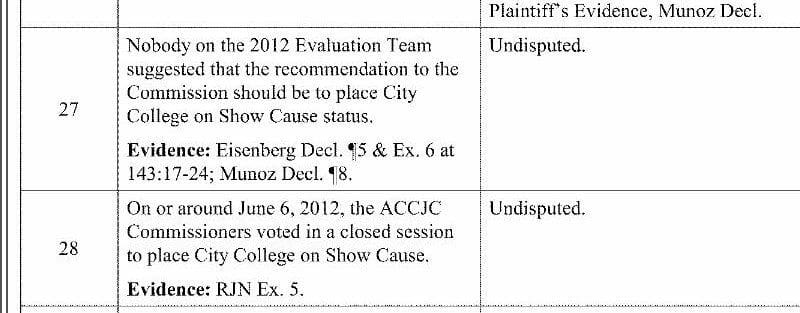
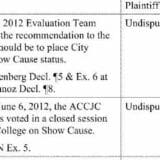
Throughout the two-year debate over a plan by the Accrediting Commission for Community and Junior Colleges (ACCJC) to shut down San Francisco’s nine-campus City College, the school’s supporters held their tongues on one key belief. Namely, that the commission had long ago made up its mind to shut down the college and no amount of restructuring could change the ACCJC’s mind. A recently filed court document, however, has confirmed this widespread suspicion.
The San Francisco Superior Court filing, first revealed in a Los Angeles Times story, disclosed that not one of the ACCJC’s own 15-member evaluation team ever suggested that CCSF’s accreditation be revoked; instead, the commission admitted, its panel merely recommended a form of academic probation that would allow the school to fix some administrative and accounting bugs in its system. Despite that, the ACCJC’s executive committee voted in 2012 to ignore the evaluators’ recommendations and threatened the school with the loss of its accreditation.
» Read more about: Fiasco: Attack on San Francisco City College Outrages CA Officials »
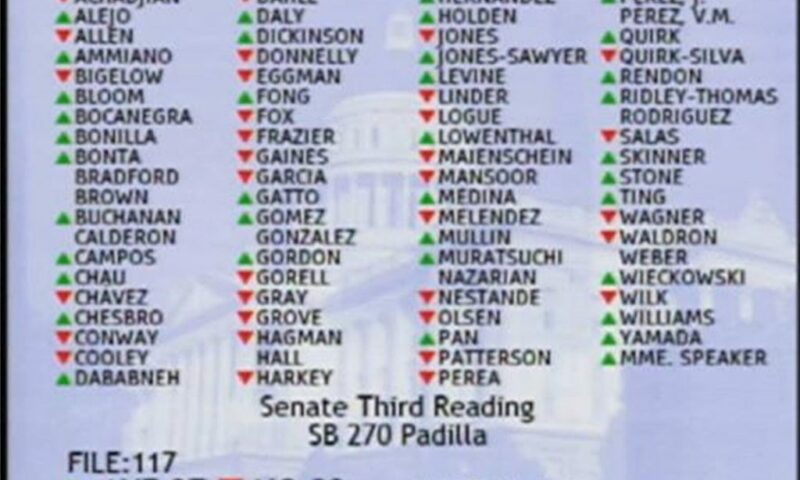
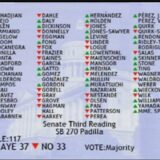
Last night the California plastic bag measure, state Senate Bill 270, fell four votes short of the required 41 to pass the Assembly. The bill’s support crossed partisan lines – however, several Democratic legislators from the Central Valley and Southern California voted no or did not vote at all. The San Jose Mercury News reported that out-of-state lobbyists representing Hilex Poly, an East Coast plastic bag company, spent nearly half a million dollars to sway legislators to oppose SB 270.
How did your state representative vote? See the voting screen, above.
SB 270, sponsored by senators Alex Padilla, Kevin De Leon and Ricardo Lara, would restrict single-use plastic bags in California, a proven policy measure to limit ocean litter. A similar ban has been implemented in more than 100 communities across California – and in such large cities as Los Angeles, San Francisco and San Jose. The effect has been reduced litter – with no jobs reported lost.